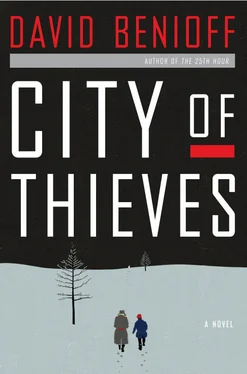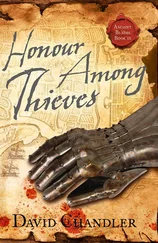“Yes, it’s a wonderful joke. And the funniest part is that we’re going to die out there and the colonel’s daughter won’t get her cake and nobody will ever know what we were doing in Mga.”
“Calm yourself, my morbid little Israelite. I won’t let the bad men get you—”
“You can eat shit.”
“—but we have to move now. If we want to make it there with any daylight left.”
I could have ignored him and gone back to sleep. The stove had gone cold in the night, the last of the wood chips burned through, but it was still warm enough under all the piled blankets. Sleeping made more sense than marching out to Mga—where the Germans waited in their thousands—in search of chickens. Anything made more sense than that. Still, no matter how much I protested the idea, I knew from the first that I would follow. He was right: there were no eggs in Leningrad. But that wasn’t the only reason for following. Kolya was a braggart, a know-it-all, a Jew-baiting Cossack, but his confidence was so pure and complete it no longer seemed like arrogance, just the mark of a man who had accepted his own heroic destiny. This wasn’t the way I had imagined my adventures, but reality ignored my wishes from the get-go, giving me a body best suited for stacking books in the library, injecting so much fear into my veins that I could only cower in the stairwell when the violence came. Maybe someday my arms and legs would thicken with muscle and the fear would drain away like dirty bathwater. I wish I believed these things would happen, but I didn’t. I was cursed with the pessimism of both the Russians and the Jews, two of the gloomiest tribes in the world. Still, if there wasn’t greatness in me, maybe I had the talent to recognize it in others, even in the most irritating others.
I stood, grabbed my coat off the floor, slipped it on, and followed Kolya to the front door, which he held open for me with grave courtesy.
“Wait,” he said, before I could cross the threshold. “We’re going on a journey. We should sit.”
“I didn’t know you were superstitious.”
“I like the traditions.”
There were no chairs so we sat on the floor beside the open door. The apartment was quiet. Timofei snored from his spot near the stove; the windows shuddered in their frames; the radio broadcast its endless metronome, signaling that Leningrad remained unconquered. Outside someone nailed posters to boarded windows with quick, efficient hammer strikes. Instead of picturing a man hanging posters, though, I imagined a coffin maker at work, fashioning a casket from planks of pinewood. The vision was intense and detailed: I could see the calluses on the coffin maker’s palms, the black hairs sprouting between his thick eyebrows, the sawdust on his sweaty forearms.
I took a deep breath and looked at Kolya. He was looking right back at me.
“Don’t worry, my friend. I won’t let you die.”
I was seventeen and stupid and I believed him.
The Moscow line had been cut only four months before, but the rails were already beginning to rust. Most of the ties had been pried from the ground and split for firewood, though they were impregnated with creosote and dangerous to burn. Kolya walked atop of one rail, a gymnast on the balance beam, hands held out to the side. I trudged along behind him, in the center of the tracks, unwilling to play his game, partly because I was angry with him, partly because I knew I’d lose.
The rails ran east past redbrick apartment blocks and three-story department stores, past the Kotlyarov streetcar barns, past abandoned factories that had built things nobody could use or afford during wartime. A crew of young women wearing overalls below their winter coats, under the supervision of an army engineer, labored to convert a post office into a defensive position. The corner of the sturdy old building had been demolished to make way for a machine-gun nest.
“Great body on that one,” said Kolya, indicating a woman wearing a blue headscarf lugging sandbags from an idling truck.
“How can you tell?”
It was a ludicrous claim. The woman was at least fifty meters away; her jacket was heavily padded and she wore several layers beneath it.
“I can tell. She has a dancer’s posture.”
“Ah.”
“Don’t give me your ah. I know ballerinas. Believe me. I’ll bring you to the Mariinsky Theater some night, take you backstage. Let’s just say I have a reputation.”
“You never shut up about your reputation.”
“There is very little in this world that makes me happier than a ballerina’s thighs. Galina Ulanova—”
“Oh, stop.”
“What? She’s a national treasure. Her legs should be bronzed.”
“You never slept with Galina Ulanova.”
He gave me a small, secretive smile, a smile that said he knew many things but couldn’t share them all at once.
“I’m being cruel,” he admitted. “Talking to you about things of this nature… it’s sadistic. Like talking about Velázquez with a blind man. Let’s change the subject.”
“You don’t want to talk about ballerinas you didn’t sleep with for the next thirty-nine kilometers?”
“Three boys go to a farm to steal chickens,” he began in his joke-telling voice. He used a different accent for jokes, though I couldn’t tell what kind of accent it was supposed to be or why he thought it made things funnier.
“The farmer hears them and rushes over to the farmhouse. So the boys jump into three potato sacks and hide.”
“Is this going to be a long joke?”
“The farmer kicks the first sack and the boy inside says, ‘Meow!’ pretending to be a cat.”
“Oh, he was pretending to be a cat?”
“I just said that,” said Kolya, looking back at me to see if I was starting trouble.
“I know he’s pretending to be a cat. Once he says, ‘Meow,’ it’s obvious he’s pretending to be a cat.”
“You’re surly again because I slept with Sonya? Are you in love with her? Didn’t you have a nice time with what’s his name? The surgeon? You looked so cute curled up together by the stove.”
“And what’s that accent you’re doing? Is it supposed to be Ukrainian?”
“What accent?”
“Every time you tell a joke you use some stupid accent!”
“Listen, Lev, my little lion, I’m sorry. I know it’s not easy for you, lying there all night, your meat in your hand, listening to her happiness—”
“Just tell your dumb joke.”
“—but I promise you, before you hit eighteen—when’s your birthday?”
“Oh, shut up.”
“I’m going to find you a girl. Calculated neglect! Don’t forget.”
All this time he continued to walk atop the steel rail, one foot in front of the other, never losing his balance, never looking down, going faster than I could walk in the usual way.
“Where was I? Ah, the farmer, he kicks the first sack, ‘Meow,’ and so on. He kicks the second sack, and the boy inside says, ‘Woof!’ Pretending to be—”
Kolya pointed at me to finish the sentence.
“A cow.”
“A dog. When he kicks the third sack, the boy inside says, ‘Potatoes!’”
We walked in silence.
“Well,” said Kolya at last, “other people think it’s funny.”
On the outskirts of the city, the apartment blocks were no longer stacked one on top of the other. The concrete and brick was now broken by stretches of frozen marsh and snow-covered lots where future buildings were meant to rise before the war ended all construction. The farther we walked from the city center, the fewer civilians we saw. Army trucks with chains on their tires rattled past, the weary soldiers in the flatbeds staring at us with no interest as they motored toward the front.
Читать дальше












